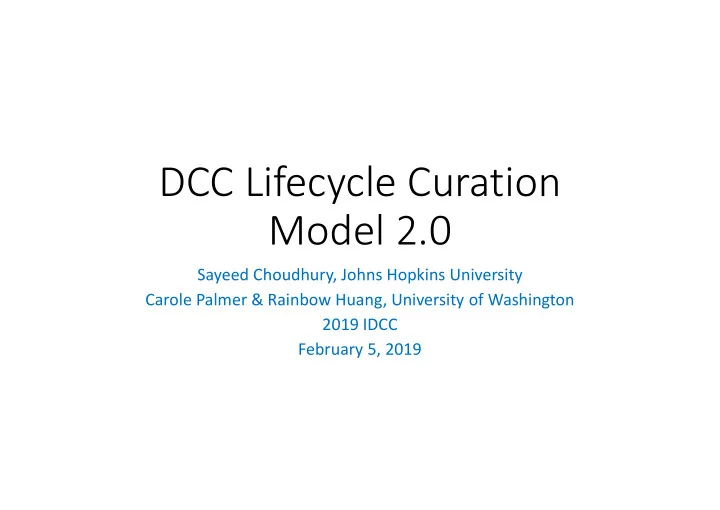

DCC Lifecycle Curation Model 2.0 Sayeed Choudhury, Johns Hopkins University Carole Palmer & Rainbow Huang, University of Washington 2019 IDCC February 5, 2019
Rationale for Research • DCC Lifecycle Model has play an important role in digital curation from both theoretical and practical perspective • Context and environment – particularly related to data – have changed notably since the inception of the model
Alfred P. Sloan Foundation Grant • Consideration of data in terms of scope, complexity, and machine actionable nature (especially as it relates to connections between data archives and high performance computing) • Assessing impact of machine learning for data processing and analytics • Casting the Lifecycle model in terms of the growing movement of integrated research workflows • Accounting for algorithmic bias, particularly as it relates to issues of diversity and inclusion
Goal and Methodology • Recommendations for next steps – not a new version of the model (if that’s even necessary) • Review of lifecycle models – both content and research • Interviews with DCC staff and analysis of documentation including original (Sarah Higgins) paper and subsequent DCC reports • I am not representing the DCC – findings and recommendations from my, Carole Palmer’s and Rainbow Huang’s (both University of Washington) synthesis
Original DCC Lifecycle Model • Motivated by desire to organize DCC website materials (and associated requests) • Based on archival science principles – possible connections to the OAIS reference model • Adapted to multiple purposes – some of which have been unintended or unplanned • Pedagogical applications were perhaps most (pleasantly) surprising • Guide for both institutions and researchers for conversation
Recommendations • Adopt a more process oriented approach accounting for workflows, sheer curation, and agile software development practices • Modular approach – focus on most relevant components for context or domain rather than entire lifecycle • Decision tree approach – extend lifecycle with framework for researchers and curators to make specific interventions • While there are some initial resources (e.g., values levers, data sheets) for considering algorithmic bias, there remains much to explore • Incorporate data science principles…
Acknowledgements • Kevin Ashley and colleagues at DCC • Carole Palmer, Rainbow Huang and colleagues at University of Washington • Sheridan Libraries at Johns Hopkins University • Alfred P. Sloan Foundation
Recommend
More recommend